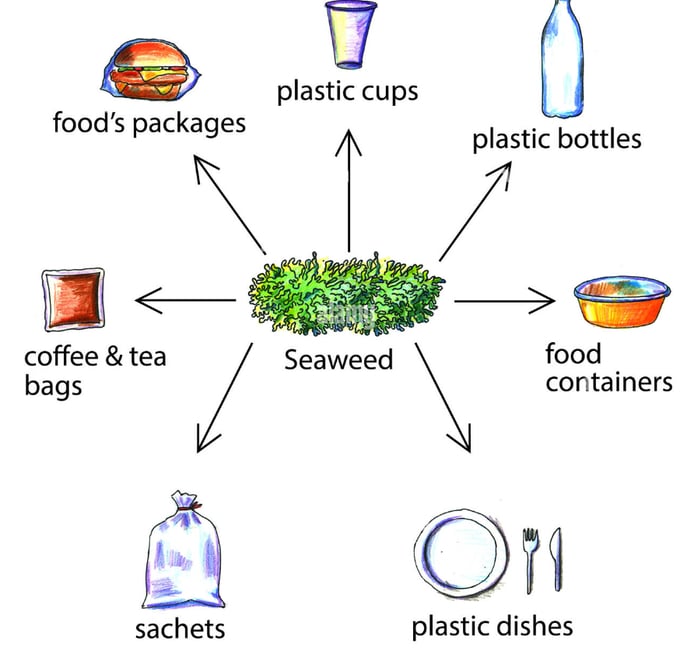November 27, 2025 | 20:50 GMT +7
November 27, 2025 | 20:50 GMT +7
Hotline: 0913.378.918
November 27, 2025 | 20:50 GMT +7
Hotline: 0913.378.918

Bioplastic products examples from seaweed. Seaweed replace plastic packaging.
“We can’t live without plastic. It’s in our clothes, laptops, nearly every man-made organic product,” he said in a press release from The National Foundation for Australia-China Relations.
“Because crude oil will disappear someday and it’s not sustainable, we have to find something to replace it,” he added.
Unlike plastic, seaweed is biodegradable which means that it decomposes without leaving any pollutants.
Dr Zhang has spent a decade studying polymers, such as plastic. And now his team has joined forces with colleagues in China to take their research beyond the lab.
China grows and harvests about three-quarters of the globe’s seaweed annually. On the Shandong Peninsula, there are seaweed farms established exclusively for polymer production. Some have been used to make products like clothing.
Dr Zhang says that expertise makes China a crucial collaborator in the field of seaweed research.
In this new project, his team will work with three major universities across Shandong. Their plan is to recruit two Chinese or Australian students into their lab and run their research in parallel with their partners in China.
Dr Zhang says making the seaweed polymer will be only one part of the process; the other is to alter the polymer to suit specific products. He gives the example of PVC, one of the most common plastic polymers. Depending on how you modify the powder-like material, it can become either very rigid (and used for pipelines) or pliable (and used for wire insulation).
It’s a similar case with seaweed-based packaging, where the right additives can make the material stronger and more durable. Part of his project will look into more environmentally friendly chemicals that can be used in this process.
Dr Zhang says both countries bring unique strengths.
“On the Australian side, we know how to modify those polymers for packaging purposes,” he says. “On the Chinese side, they know how to extract the polymer from seaweed, and make those materials fit our requirements. So, our knowledge meets together to make packaging suitable for the real world, not just in the lab.”
Dr Zhang believes seaweed and other plants could replace plastic for good.
“More than 70 percent of our earth is the sea, so we have a great potential to farm plants in the sea to produce polymers,” he says.
He says these seaweed-based products could also help to tackle climate change by reducing our reliance on fossil fuels.
Unlike crude oil, seaweed doesn’t release huge amounts of carbon dioxide into the atmosphere. In fact, it absorbs CO2, leading some scientists to tout it as a carbon sink. One study found that seaweeds globally could sequester or store about 175 million tonnes of CO2 a year.
“If we can fix carbon in the air [from a gas to a solid], we’re going to reduce our greenhouse gas potential,” Dr Zhang says.
“So if all our plastics originate from seaweed, that means we could fix millions, maybe billions, of CO2 currently in the air.”
He says the plant could curb an even more harmful greenhouse gas—methane—which plastics release as they break down over time. Over 100 years, one tonne of methane could trap about 27-30 times as much heat as one tonne of carbon dioxide.
“Methane is going to cause a very bad global warming effect,” he says.
But despite the promise of seaweed-based technology, Dr Zhang says we still have some way to go before it can be rolled out into our homes and supermarkets.
“We can’t use it yet, not because we don’t have this type of technology but because there’s an added cost that would be passed onto us as consumers,” he says.
“If it’s one product, it might be an extra one or 10 cents which doesn’t seem like much. But if we try to replace all packaging, it would be very expensive, so government and private sector support is super important to help reduce the cost.”
Dr Zhang hopes that his project will offer a blueprint for how seaweed research can be done.
“The breakthroughs may not come from me, but with more interest and investment, a lot of progress can occur in the years to come,” he says.
This project is supported by the National Foundation for Australia-China Relations.
(The Fishsite)

(VAN) A new study reveals how the simultaneous effects of ocean acidification, salinity and loss of oxygen are making the world more fragile.

(VAN) Hopes are growing that the creation of the first 3D turkey gut model could be a turning point in the battle against the virulent blackhead disease.

(VAN) Tyson, America’s biggest meat supplier, plans to shutter one of its largest beef processing plants as the industry continues to struggle with low cattle supplies and political pressure from Washington.

(VAN) New FAO study shows how digital solutions are empowering farmers and fishers to prevent losses and build resilient agrifood systems.

(VAN) Brazil's COP30 presidency pushed through a compromise climate deal on Saturday that would boost finance for poor nations coping with global warming but that omitted any mention of the fossil fuels driving it.

(VAN) Poultry farmers in the UK have been warned that they could face one of the worst winters yet for bird flu.

(VAN) Prices of main-crop paddy have risen sharply, with jasmine rice hitting 16,100 baht per tonne — the highest level in years.